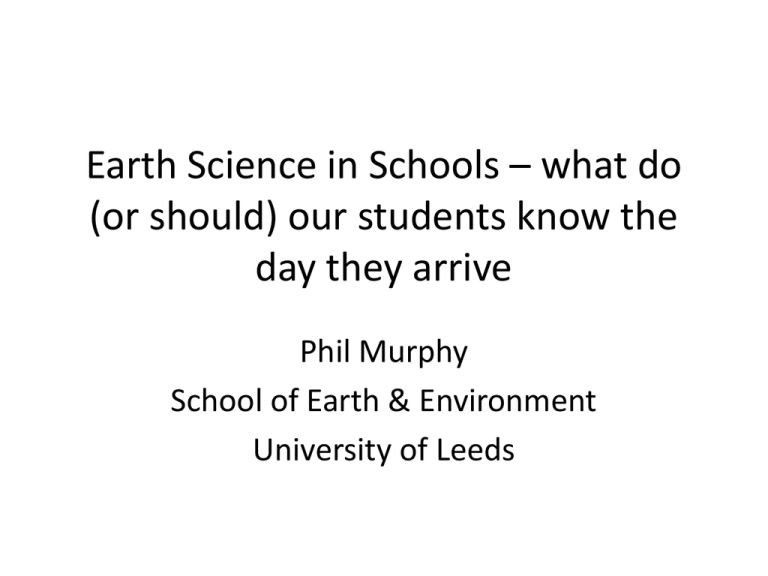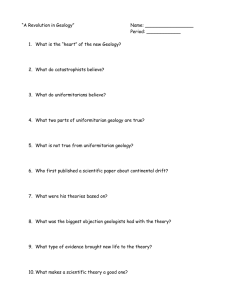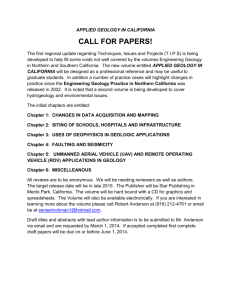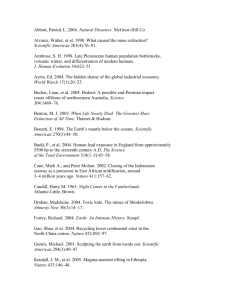Earth Science in Schools – what do (or should) our students know
advertisement

Earth Science in Schools – what do (or should) our students know the day they arrive Phil Murphy School of Earth & Environment University of Leeds Earth Sciences Earth System Science Geoscience •? Reservoir Engineer Reservoir Geology National Curriculum For Science • Introduced (England & Wales) 1989 • Latest version 2008 • Earth science component new to many teachers Key Stage 3 PoS • 3.4 The environment, Earth and universe • a geological activity is caused by chemical and physical processes • b astronomy and space science provide insight into the nature and observed motions of the sun, moon, stars, planets and other celestial bodies • c human activity and natural processes can lead to changes in the environment. • www.qcda.gov.uk/curriculum/ Key Stage 4 PoS • 2.4 Environment, Earth and universe In their study of science, the following should be covered: • the effects of human activity on the environment can be assessed using living and non-living indicators • the surface and the atmosphere of the Earth have changed since the Earth’s origin and are changing at present • the solar system is part of the universe, which has changed since its origin and continues to show longterm changes. • www.qcda.gov.uk/curriculum/ problems -Earth sciences largely placed in chemistry (resented by some chemistry teachers) -Limited support material available -What material was available of questionable quality The Mantle…. What colour is the ocean floor? Solutions: Kennett 2006 Kennett 2006 Deep Time • 4.4-4.8 billion – 7 • 4 or 5 billion – 9 • 3-100,000 billion - 46 Money!!!! • School students are not aware of the possible remuneration of a career in Geology & Geophysics • 103 students, year 10, rated geology below medicine, business & civil engineering for earning potential Coursework: • Revisit • Revisit • Revisit • Revisit! Very specific questioning: GCSE changes starting 2011 OfQual-office of qualifications and examinations regulation (QCDA no longer exists…) • Controlled Assessment – much tighter controls on coursework • Modules can only be re-sat once • At least 40% of assessment has to be in the final exam OCR GCSE Gateway Science Suite Science B (Draft) Describe the mantle as the zone between the crust and the core which is: • cold and rigid just below the crust • hot and non-rigid at greater depths and therefore able to move. Describe the theory of plate tectonics: -energy transfer involving convection currents in the semi-rigid mantle causing the plates to move slowly - oceanic crust more dense than continental crust -collision between oceanic plate and continental plate leads to subduction and partial melting - plates cooler at ocean margins so sink and pull plates down. CONCLUSIONS • Have done some geology in science • Amount (and quality) varies • May not know it is geology • Looks likely that the geology in science GCSE will remain on the curricula for the next few years Things to be a aware of… • Schools do not owe you a living • Exam points= prizes in schools • Schools are much better resources than we are Future: •Academies…………. Kennett P 2006. Comparisons of the New GCSE Science Specifications for their Earth Science Content. Teaching Earth Sciences Vol.31(2) 28-34 King C 2009. An analysis of misconceptions in science textbooks: earth science in England and Wales. International Journal of Science Education, 31. ISSN: 1464-5289 Murphy P J & Murphy E 2007. Student perceptions of geology as a career option. Teaching Earth Sciences Vol.32 (1) p22


